Results
-
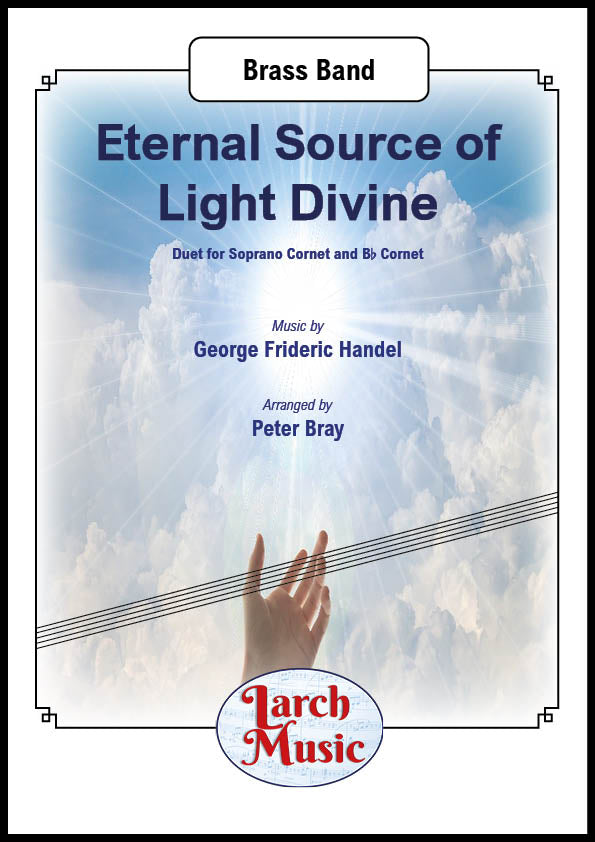 £30.00
£30.00Eternal Source of Light Divine - Duet (Soprano Cornet & Bb Cornet) with Brass Band Full Score & Parts - LM548
COMPOSER: George Frideric HandelARRANGER: Peter BrayThe cantata celebratesQueen Anne'sbirthday, and the accomplishment of theTreaty of Utrecht(negotiated by theToryministry of Anne in 1712) to end theWar of the Spanish Succession. It was scored for 3 solo voices, choir and chamber orchestra.Queen Anne was said by the Duke of Manchester to be "too careless or too busy to listen to her own band, and had no thought of hearing and paying new players however great their genius or vast their skill."Nevertheless, and whether or not she ever heard this ode for her birthday, she granted Handel a "pension" (subsidy for living expenses) of two hundred pounds a year, for lifeHere is the delightful arrangement for Soprano Cornet and Bb Cornet with Brass Band Accompaniment
In Stock: Estimated dispatch 3-5 working days
-
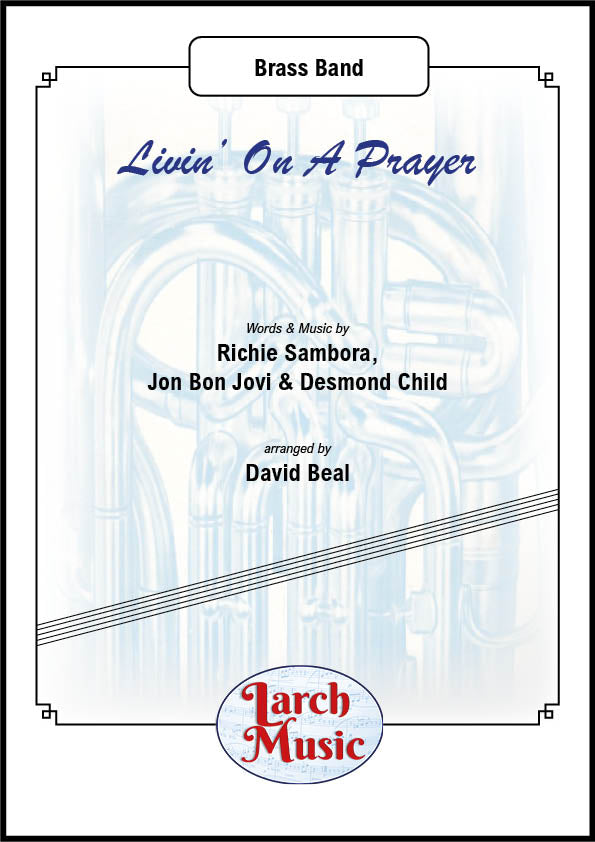 £30.00
£30.00Livin' On A Prayer - Brass Band Sheet Music Full Score & Parts - LMAM019 - Richie Sambora, Jon Bon Jovi & Desmond Child - David Beal
COMPOSER: Richie Sambora, Jon Bon Jovi & Desmond ChildARRANGER: David Beal"Livin' on a Prayer" is a song by the American rock band Bon Jovi from their third studio album, Slippery When Wet. Written by Jon Bon Jovi, Richie Sambora and Desmond Child, the single, released in late 1986, performed strongly on both rock and pop radio and its music video was given heavy rotation at MTV, giving the band their first song to reach No. 1 on the Billboard Mainstream Rock chart and their second consecutive No. 1 Billboard Hot 100 hit.Regarded as the band's signature song, "Livin' on a Prayer" has topped fan-voted lists and re-charted around the world decades after its release. In 2013, the song was certified triple platinum for over 3 million digital downloads and has since sold over 13 million worldwide, making it one of the best selling singles of all time.Scored here for British Brass Band.Any purchases from this site cannot be made please click on the link above
In Stock: Estimated dispatch 3-5 working days
-
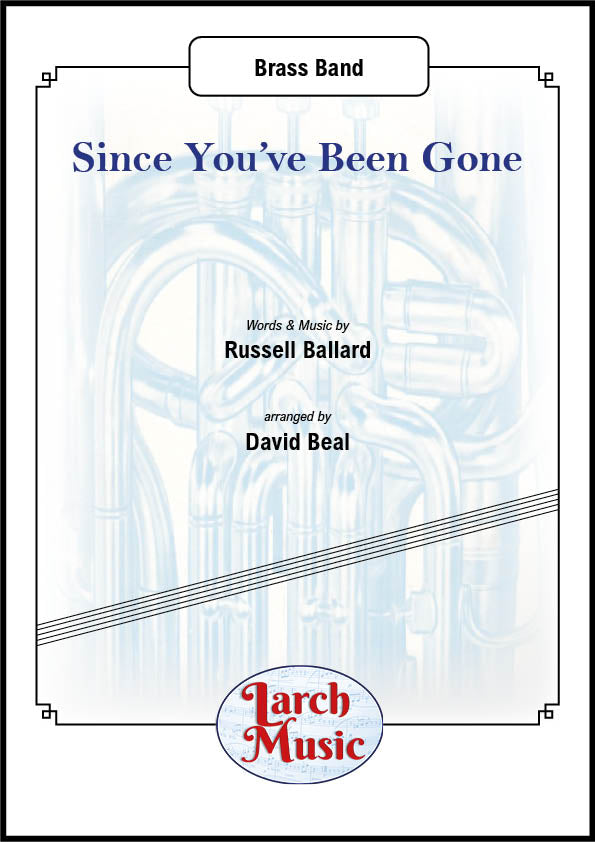 £25.99
£25.99Since You've Been Gone - Brass Band Sheet Music Full Score & Parts - LMAM021
COMPOSER: Russell BallardARRANGER: David Beal"Since You Been Gone" is a song written by former Argent guitarist Russ Ballard and first released on his 1976 album Winning. It was covered by Rainbow in 1979 and released as a single from their album Down to Earth.In 1979, "Since You Been Gone" was covered by Rainbow, who released it as the first single from their 1979 album Down to Earth with Graham Bonnet on lead vocals. It was a top-10 single in the United Kingdom, where it reached number six. In the US, the song reached number 57. It was named the 82nd-best "Hard Rock Song of All Time" by VH1. The song was later included on the second trailer and on the soundtrack to Guardians of the Galaxy Vol. 3, which first aired on February 12, 2023, during Super Bowl LVII.Scored for British Brass BandAny purchases of this Item cannot be made from this listing please click on the link above - Any purchase using this site will be refunded
In Stock: Estimated dispatch 3-5 working days
-
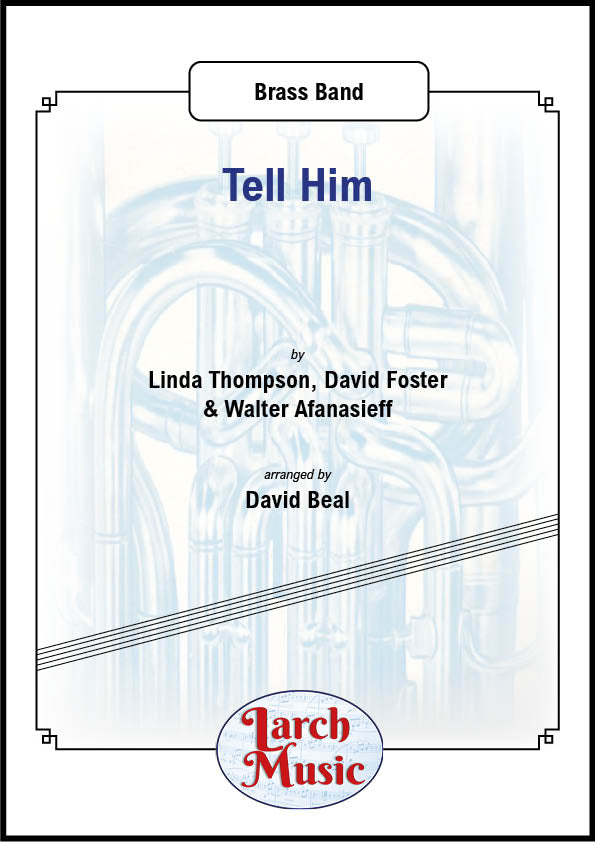 £30.00
£30.00Tell Him - Brass Band Sheet Music Full Score & Parts - LMAM007 - David Foster, Linda Thompson & Walter Afanasieff - David Beal
Any purchases of this Item cannot be made from this listing please click on the link above - Any purchase using this site will be refundedCOMPOSER: David Foster, Linda Thompson & Walter AfanasieffARRANGER: David Beal"Tell Him" is a song written by Linda Thompson and producers Walter Afanasieff and David Foster. It was recorded as a duet between American singer Barbra Streisand and Canadian singer Celine Dion for their 1997 albums, Higher Ground and Let's Talk About Love, and released as the lead single from these albums on November 3, 1997.And now available for Brass Band...Any purchases of this Item cannot be made from this listing please click on the link above - Any purchase using this site will be refundedAbout Digital DownloadsDigital Downloads are downloadable sheet music files that can be viewed directly on your computer, tablet or mobile device. Once you download your digital sheet music, you can view and print it at home, school, or anywhere you want to make music, and you don't have to be connected to the internet. Just purchase, download and play!PLEASE NOTE: Your Digital Download will have a watermark at the bottom of each page that will include your name, purchase date and number of copies purchased. You are only authorized to print the number of copies that you have purchased. You may not digitally distribute or print more copies than purchased for use (i.e., you may not print or digitally distribute individual copies to friends or students).
In Stock: Estimated dispatch 3-5 working days
-
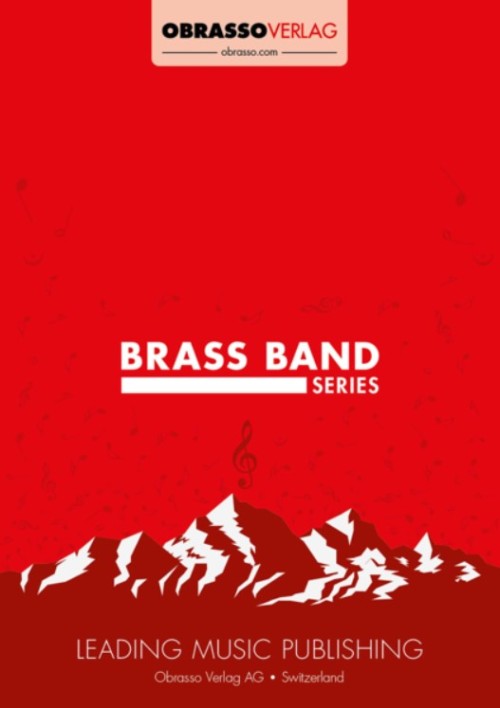 £59.70
£59.70A Christmas Fantasy (Brass Fanfare Group with Brass Band - Score and Parts) - Wood, Stephen D.
The fanfare team comprises of:Eb Soprano Cornet1 Solo CornetRepiano Cornetthe 3 TrombonesThey should be positioned away from the band as a separate unit or split into two groups for a more antifonal effect.Duration: 7.00
Estimated dispatch 7-14 working days
-
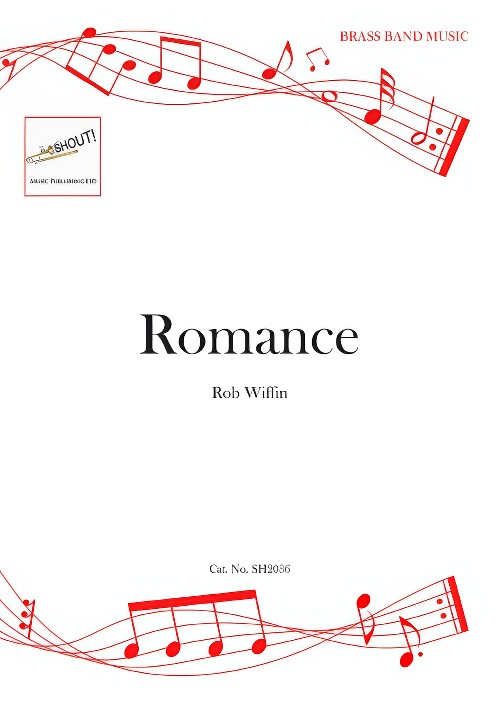 £23.95
£23.95Romance (Brass Band - Score and Parts) - Wiffin, Rob
This simple little romance was written in the style of a Catalan folk song. It is entirely original and undoubtedly influenced by the arrangements of Catalan folk songs for guitar by Miguel Llobet (1878-1938). Typical of the style, the tune is in 6/8 with a gentle lilt and has just one rather refined outburst of passion before retreating back into its shell. The lyrical nature of the music is particularly suited to the brass band.Duration: 3.30
Estimated dispatch 7-14 working days
-
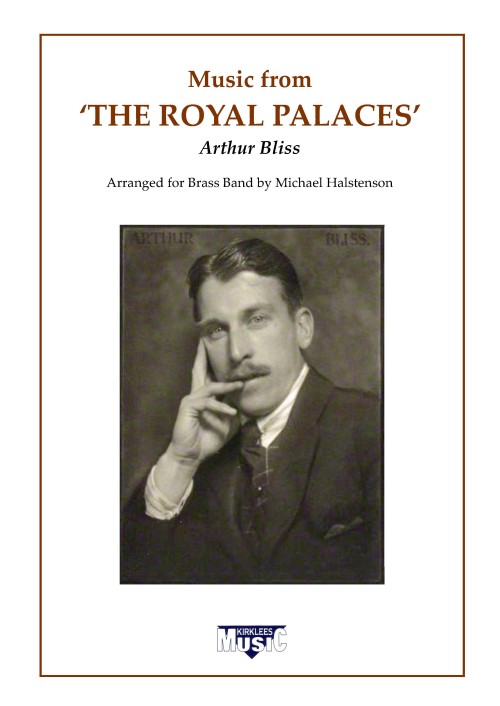 £75.00
£75.00Music from The Royal Palaces (Brass Band - Score and Parts) - Bliss, Arthur - Halstenson, Michael
Selected as the Section 3 test piece for the National Brass Band Championships of Great Britain 2025Music from 'The Royal Palaces', arranged by Michael Halstenson in 2023, is also cast in five movements: the quietly regal 'Queen Victoria's Call to the Throne'; 'The Ballroom in Buckingham Palace' waltz evoking the gaiety of functions at Buckingham Palace; 'Joust of the Knights in Armour' (George V's reign) depicting knights preparing to joust; 'Melodrama' characterising the murder at Holyrood House (Edinburgh) of Mary, Queen of Scots' Secretary, David Rizzio; and the majestic 'The Royal Palace Theme' march.
Estimated dispatch 7-14 working days
-
 £29.95
£29.95Music from The Royal Palaces (Brass Band - Score only) - Bliss, Arthur - Halstenson, Michael
Selected as the Section 3 test piece for the National Brass Band Championships of Great Britain 2025Music from 'The Royal Palaces', arranged by Michael Halstenson in 2023, is also cast in five movements: the quietly regal 'Queen Victoria's Call to the Throne'; 'The Ballroom in Buckingham Palace' waltz evoking the gaiety of functions at Buckingham Palace; 'Joust of the Knights in Armour' (George V's reign) depicting knights preparing to joust; 'Melodrama' characterising the murder at Holyrood House (Edinburgh) of Mary, Queen of Scots' Secretary, David Rizzio; and the majestic 'The Royal Palace Theme' march.
Estimated dispatch 7-14 working days
-
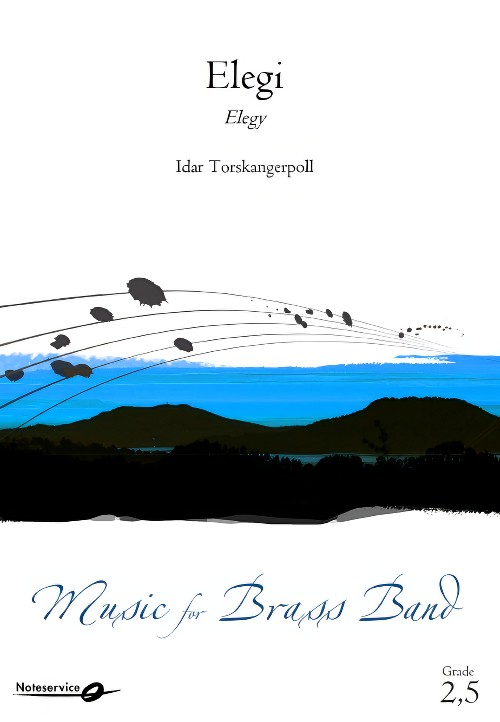 £94.90
£94.90Elegi (Elegy) (Brass Band - Score and Parts) - Torskangerpoll, Idar
This piece originates as a piano piece written by the composer as he was convalescing after an illness and operation. In the music there is an outlet for emotions of uncertainty and doubt, but also of hope for the future. The piece was later arranged for wind and brass band, and premiered at a music summer camp in 2021.This piece has a melancholy character and suits bands looking for a piece to work on sound, phrasing, dynamics and expression.Duration: 3.45
Estimated dispatch 7-14 working days
-
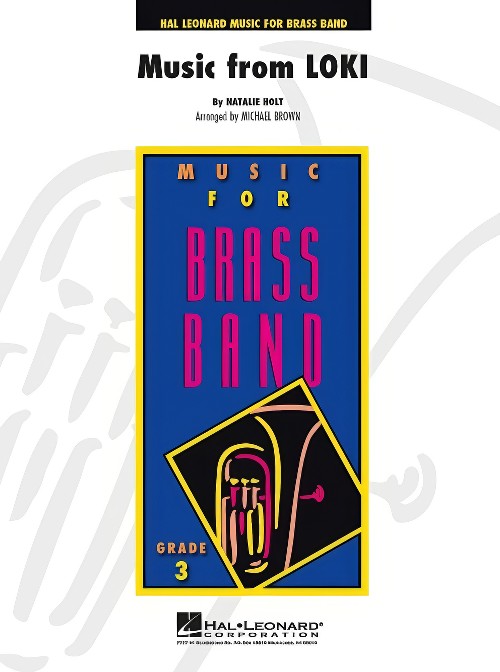 £74.99
£74.99Loki, Music from (Brass Band - Score and Parts) - Holt, Natalie - Bond & Brown
Loki further unravels the ever-expanding tapestry of the Marvel universe. Natalie Holt's memorable soundtrack is dramatic and engaging, and presented here in a powerful arrangement of the main themes for brass band.Duration: 3.30
Estimated dispatch 7-14 working days




